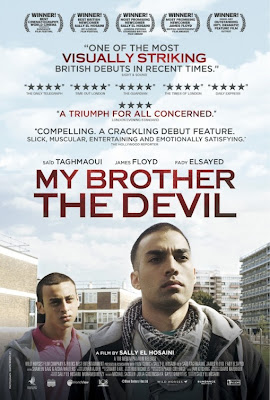"What were they thinking?" comes immediately to mind when perusing some of the fulsome praise of British critics for the first full-length film from Sally El Hosaini (shown below) entitled MY BROTHER THE DEVIL, a not particularly new or novel look at Arab immigrants in Britain and their adventures concerning family, street gangs and love interests. After watching this not-bad (for its first half, at least) family dramedy about an Egyptian immigrants in Great Britain, which has garnered simply amazing reviews from the press in Britain, I found myself trying to figure out why.
Could it be, for a change, that the subjects here are not Pakistani (an immigrant group particularly unpopular with white Brits, and about which we've seen, over the years, a number of films)? Maybe it's easier to root for Egyptians. One of the quotes says that the movie is "visually striking." Certainly no more so than many other British films. (I just saw one yesterday which I'll cover next week -- Welcome to the Punch -- possessing infinitely more striking visuals.)
One of my notes scribbled during the viewing states, "Stories sure don't change -- the young kid pulled into a life of crime -- only the time frame and milieu." What the writer/director does excel at is giving us teens and slightly older characters, at home and in the streets, with a lifelike energy and reality. This part of the film is fun and mostly believable, although English subtitles might have been a help from time to time.
The film begins with everyone thrilled at the younger son's "genius" abilities in school. But that's the last we hear of that. As the movie goes on, coincidence and melodrama completely push reality to the sidelines, if not off-screen altogether. By the finale, any believable characterization and/or accumulation of events have been tossed out the window. The most ridiculous situation occurs midway, as the older brother -- who has given up his own middling/piddling life-of-crime and now works for a successful photographer -- discovers something about himself that, up until now, neither he nor we have had a clue. Revealing this would be a major spoiler (although the stupid trailer for the film does this, of course -- which is why TrustMovies generally detests trailers and never includes them on his site).
This major change in the older brother's life happens with such amazing ease and speed, given the culture he comes from, that it renders the movie ridiculous, pushing it toward the happy, feel-good ending that the filmmaker and her producers evidently crave. Oy! -- as another, neighboring culture might proclaim. What happens in this film to its main character is something that other films build entire plots around. To handle it in the manner shown here insults the intelligence of everyone involved: characters, filmmakers, and audience.
The cast assembled is certainly eager, photogenic and talented, with James Floyd (above and further above), whose brooding beauty is particularly stunning in the role of the older brother, and Fady Elsayed (at bottom, left, and further above on a bike and in a tree) almost equally watchable in the younger brother role. The actor most well-know to film-goers would be Said Taghmaoui, below, who plays the photographer but has almost nothing to do in the film except provide the link that hastens the big "changeover."
The women's roles are minor -- no surprise given the culture here -- with the brother's mother providing the caring, the older's bro's girlfriend (Elarica Gallacher) the sex (for awhile, anyway), and the younger bro's new girlfriend (Letitia Wright) the proper sweetness. I can't fault the acting here, from any of the cast members, and the ensemble work toward to the beginning of the film, from the perfor-mers playing both family and gang members, is quite impressive.
But if you can buy -- hell, even tolerate -- the plot machinations of this silly movie, you're a better man than I am, Gunga Din. From Paladin and 108 Media, My Brother the Devil opens tomorrow, March 22, in New York City at the Landmark Sunshine Cinema and the Elinor Bunin Munroe Film Center, and on April 5 in Los Angeles at the Nuart, with a limited national release to follow.
Subscribe to:
Post Comments (Atom)












No comments:
Post a Comment